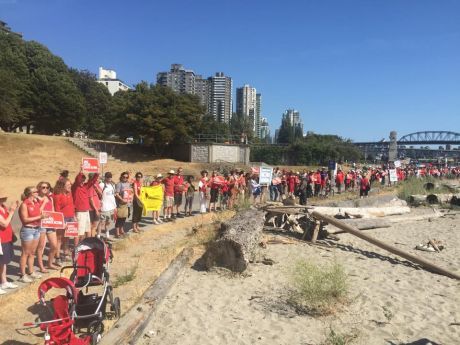Shared
You are here
Raise wages not sea levels

July 15, 2015
On July 4, 400 Vancouverites gathered on sunset beach, joining communities across Canada in a nationwide day of protest to stand up for jobs, justice, and climate action. Protests overlooked English Bay, the site of April’s bunker fuel spill, where the bulk carrier cargo ship Marathassa leaked thousands of litres of the highly toxic bunker C oil into Vancouver harbour.
“For too long, the environmental movement has branded itself as just protecting environmental interests,” says Kaschelle Thiessen, an organizer with the Vancouver Day of Action. She says, “folks are coming together and asking our government to take a stronger stance on climate change and to begin to transition to greener jobs.”
The event sought to highlight the environmental impacts of the tar sands, demanding a halt to the five tar sands pipeline projects being proposed, while other major polluter industries, including coal and liquid natural gas, were also targeted. The message however, was not just about pollution and emissions.
Thiessen says we can’t have a strong environmental progress, “without raising the minimum wage, without a living wage, without fights for stronger unions.” The current minimum wage in British Columbia is $10.25 per hour, with increases based on inflation. The BC Federation of Labour has been campaigning for a $15.00 per hour minimum wage.
“We’re requesting an increased minimum wage so that there is an incentive to move out of polluting industries and so we have a viable choice to move into jobs that are greener,” says Thiessen. “We are not able to say shut down oil without also having opportunities for other people to move into jobs that they can make money on,” says Thiessen. “We should be moving money from those industries, supplying people with jobs.”
The Tyee reports that the Canadian government provides 34 billion dollars per year in subsidies to energy producers, of which petroleum producers are major benefactors. Theissen proposes moving money from polluting industries and fossil fuel subsidies into transit, a living wage, and improving rural economies. She says unions have a large role to play in advocating for a transition to a green economy that benefit workers.
The action came to an end with a spiral dance, whereby several hundred people linked arms and formed a giant human chain along the seawall, representing a “line in the sand” in solidarity with communities across Canada advocating for coastal protection, green job opportunities, social justice, and climate change.
The event was organized by grassroots organization 350.org, in collaboration with community organizations. As Thiessen explains, the name 350.org comes from the number of parts per million of carbon dioxide emissions that society must limit itself to in order to avoid global temperatures rising above the potentially disastrous 2 degrees Celsius.
Protestors were joined by a flotilla of boats from the Salish Sea Tour, an exciting initiative bringing a local lens to climate change issues through touring communities along the Salish Sea.
This is shared from rankandfile.ca
Section:









